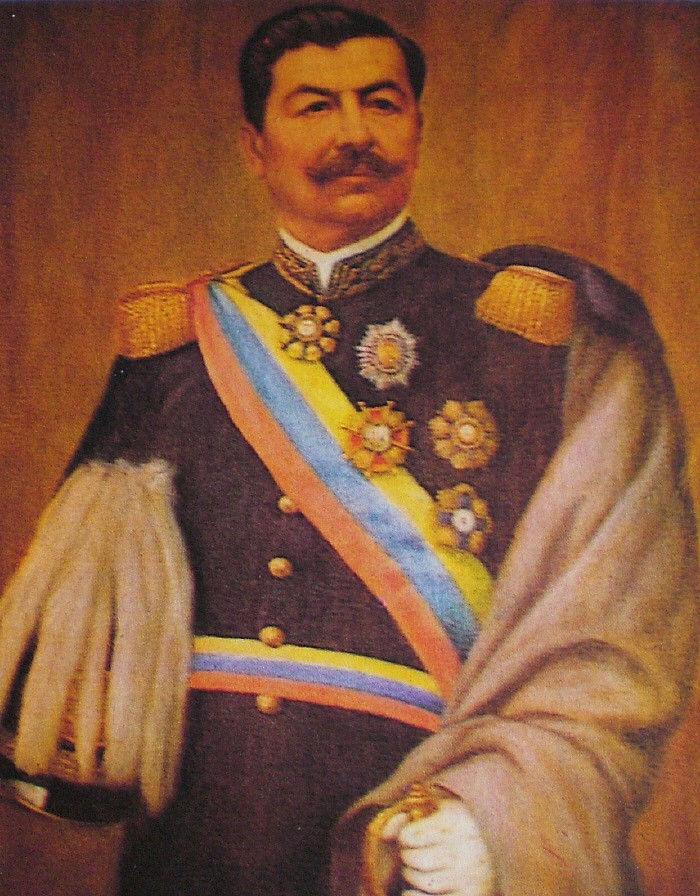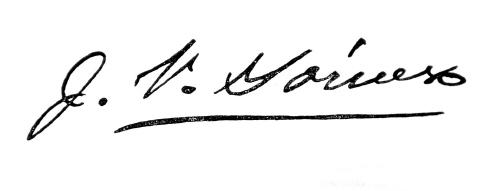- Juan Vicente Gómez
Infobox_President | name=Juan Vicente Gómez

order=38thPresident of Venezuela
term_start=December 19 ,1908
term_end=August 13 ,1913
predecessor=Cipriano Castro
successor=José Gil Fortoul
order2=40thPresident of Venezuela
term_start2=1922
term_end2=May 30 ,1929
predecessor2=Victorino Márquez Bustillos
successor2=Juan Bautista Pérez
order3=42ndPresident of Venezuela
term_start3=June 13 ,1931
term_end3=December 17 1935
predecessor3=Juan Bautista Pérez
successor3=Eleazar López Contreras
birth_date=birth date|1857|7|24|mf=y
birth_place="Hacienda La Mulera",Táchira ,Venezuela
death_date=death date and age|1935|12|17|1857|7|24|mf=y
death_place=Maracay , Aragua,Venezuela
 |
|Juan Vicente Gómez (
July 24 ,1857 -December 17 ,1935 ) was a military general and the ruler ofVenezuela from 1908 until his death in 1935. He was president on three occasions during this time, and ruled as an unelected military strongman for the rest of the era.Early years
Gómez was a barely literate cattle herder and a nearly full-blooded Native American. In 1899, he joined the private army of
Cipriano Castro , with whom he had been friends since Castro's exile inColombia . This army swept down onCaracas in 1899 and seized control of the country. He became Castro's vice president and, in 1902, head of the military, responsible for suppressing several major revolts against the government. Gómez seized power from Castro onDecember 19 ,1908 , while Castro was in Europe for medical treatment.Presidency
As president, Gómez managed to deflate Venezuela's staggering debt by granting concessions to foreign oil companies after the discovery of
petroleum inLake Maracaibo in 1918. This, in turn, won him the support of theUnited States andEurope and economic stability. Though he used the money to launch an extensive public works program, he also received generous kickbacks, increasing his personal fortune enormously. Because of his contributions to the country's development, the Congress bestowed the title of "El Benemérito" (the Meritorious One) on him. In contrast, his opponents, who disdained his brutal tactics at home, referred to him as "El Bagre" (theCatfish ), a snide reference to his bushy moustache and outward appearance. They also called him "the Tyrant of theAndes "--a reference to his roots in the mountain state of Táchira.On
April 19 ,1914 , Gómez ostensibly stepped down from office in favor of provisional presidentVictoriano Márques Bustillos , though he continued to rule the country from his home inMaracay . He returned to office in 1922, ruling untilApril 22 ,1929 . Though he was reelected to a new term of office by the Congress, he declined to return to the capital, andJuan Bautista Pérez assumed the presidency, though Gómez remained the final authority in the country. OnJune 13 ,1931 , Congress forced Perez to resign, and elected Gómez president again. This time, he resumed office, ruling the country until his death.Family
There were two official lovers of Gómez, the first Dionisia Gómez Bello, with whom he had seven children: José Vicente, Josefa, Alí, Flor de María, Graciela, Servilia and Gonzalo, and the second, Dolores Amelia Núñez de Cáceres, with whom we had eight children: Juan Vicente, Florencio, Rosa Amelia, Hermenegilda, Cristina, Belén, Berta and Juan Crisóstomo. However, Gómez also fathered between sixty four and eighty four illegitimate children, many of whom he appointed to public office (along with some of his legitimate children), sparking charges of
nepotism .Legacy
Gómez's rule of Venezuela is a controversial period in the country's history. His cunning leadership brought enrichment to the country, particularly after the discovery of oil. He used that wealth to develop a modern infrastructure.
On the debit side, he is one of the prominent examples to the early
US rule inLatin America [Woddis, J. (1967). An Introduction to Neocolonialism. London: Lawrance & Wichart.] . During his rule, most of the country's wealth ended up in the hands of Gómez, his henchmen, andWall Street [Woddis, J. (1967). An Introduction to Neocolonialism. London: Lawrance & Wichart.] . Indeed, at the time of his death, he was by far the richest man in the country. He did little for public education and held basic democratic principles in disdain. Although cordial and simple in manner, his ruthless crushing of opponents through his secret police earned him the reputation of a tyrant. He was also accused of trying to make the country a personal fief.Former Venezuelan President
Rómulo Betancourt said in his book "Venezuela : Oil and Politics" that "(...) Gomez was something more than a local despot, he was the instrument of foreign control of the Venezuelan economy, the ally and servant of powerful outside interests". This is in reference toRoyal Dutch Shell andStandard Oil 's appeasement of the dictator in return for exploitation rights of the country's oil fields.In Venezuelan politics, Juan Vicente Gómez has come to symbolize political endurance and a
caudillo mentality. He was quoted as saying he needed a lifetime to fulfill his political work.External links
* [http://www.infoplease.com/ce6/people/A0821224.html Biography at infoplease.com]
* [http://www.country-data.com/cgi-bin/query/r-14516.html Venezuela - A Century of Caudillismo] - A recount of the historical context, Gomez's career and influence.References
See also
*
Venezuela
*Presidents of Venezuela
Wikimedia Foundation. 2010.
